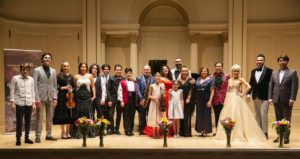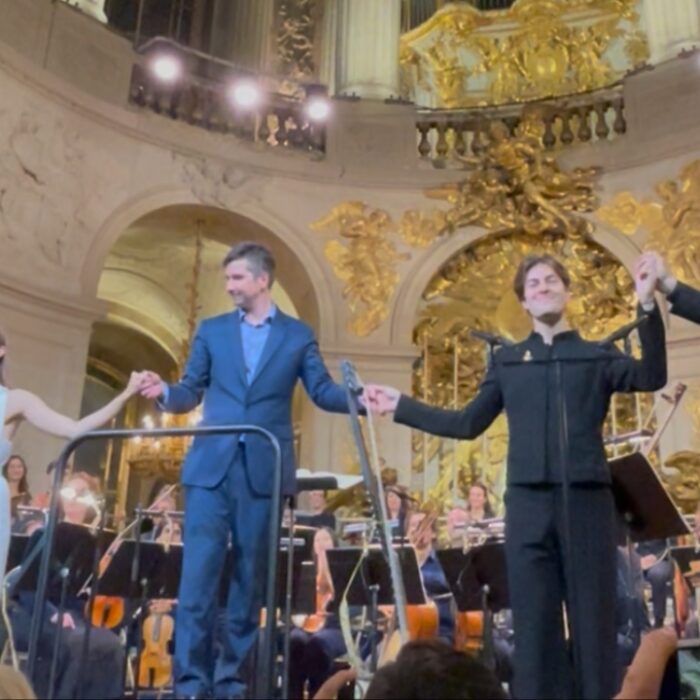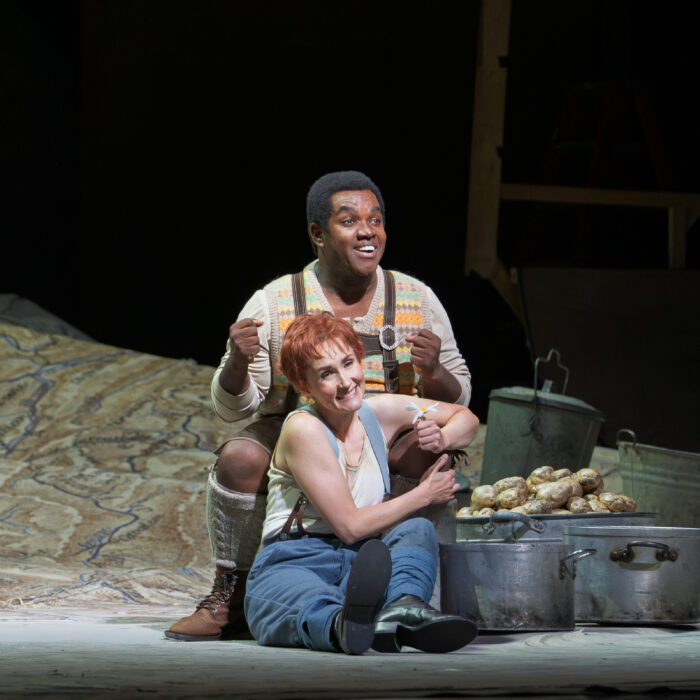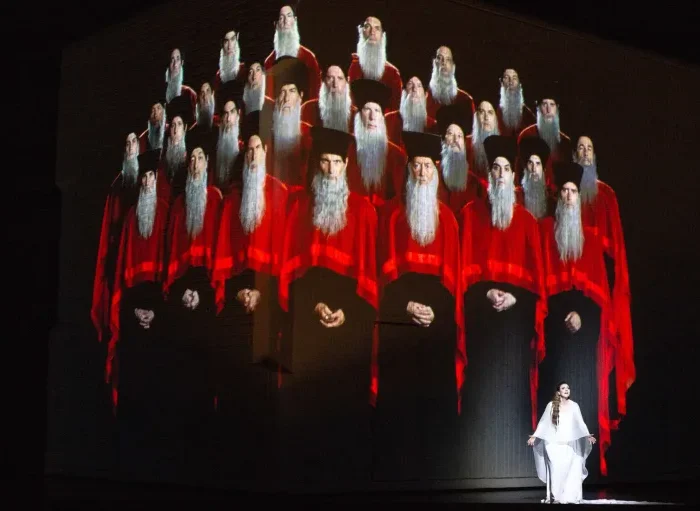
Carnegie Hall 2018-19 Season Review: David Gvinianidze & Friends
By Logan MartellOn Sept. 20, 2019, Talents of the World returned to Carnegie Hall for an exciting concert, titled “David Gvinianidze and Friends.” Featuring a lineup of not just established artists, but winners of Talents of World’s “International Youth Music Competition” in Georgia, what ensued was a breathtaking showcase celebrating cherished works while introducing fresh and highly talented new artists.
The night’s concert was kicked off, fittingly, with Rodgers and Hammerstein’s “Some Enchanted Evening” from “South Pacific,” sung by Talents of the World’s President and Founder, baritone David Gvinianidze, who was accompanied by pianist Victoria Ulanovskaya. After the warm strength of his opening lines, Gvinianidze displayed remarkable delicacy at key moments within the song, such as the end of the third chorus with the phrase “or all through your life you may dream all alone,” sustaining the last words to a great length. For the rich and earthy timbre of Gvinianidze’s voice, his final pianissimo was something to behold.
Stunning Young Soloists
The concert’s roster of artists included not just vocalists, but a number of promising young instrumentalists as well. First up among them was 10-year old pianist Lizi Megrelishvili, who played Chopin’s “Nocturne in C–sharp minor.” The placid circling rhythm following the opening chords were brightened by her well-executed trills and expressive falling melodic lines. Megrelishvili also showed wonderful control in the quick runs of cresting dissonance, tapering out as the piece returned to its A section.
After this came violinist Anamaria Khingava, with Kreisler’s “Preludia – Allegro.” The accompaniment’s dire chords were enriched by Khingava’s plaintive melody, with the former often tapering away to let her mournfully fill the silence. A later section featured dark rumblings from the piano’s depths over which Khingava wove a tapestry of tones and colors, the two instruments strongly worked their way back to a united finish.
Next of the pianists was Nika Nikabadze, who performed Sulkhan Tsintsadze’s “2 Preludias.” The clear, shimmering arpeggios of the introduction were contrasted by the deep punctuations from the lower register, with these aural colors giving way to a section of frenzied, gripping murkiness. Lasting through the rest of this piece, this dissonant, invigorating deluge ended with no clear resolution as the music simply stopped and Nikabadze bowed and walked offstage to great applause.
Following this was flautist Amiran Kakabadze, playing a melody from Gluck’s “Orfeo and Euridice.” Accompanied by Nana Doghonadze, the larghetto 4/4 rhythm was illuminated by Kakabadze’s heartfelt, almost pleading, melodic lines.
Bringing things back to a more operatic mood was soprano Mariam Kuchava, singing “O Mio Babbino Caro,” from Puccini’s “Gianni Schicchi.” Her weighty quality of voice sounded to have some trouble with the passionate and expansive vocal leaps, bearing a slightly more forceful touch. About halfway through the aria, Kuchava hit her stride, reaching a softer dynamic as she became more wrapped up in the dramatic context of the piece. Originally slated to sing “Plenivshis Rosoj Solovei” by Rimsky-Korsakov,” Kuchava handled this change with an overall elegant bearing throughout.
Second of the violinists was Sofio Giorgadze, with “Spanish Dance” by Manuel De Falla. Backed by a driving accompaniment, Giorgadze opened with great zeal as the piece alternated between virtuosic trills and runs, and more lyrical passages that sang under Giorgadze’s finger-work, as she worked towards a brief but uplifting conclusion.
Next was pianist Saba Mikeladze, with Prokofiev’s “Op. 28 Sonata #3.” An instant flurry of chromaticism opened the piece as Mikeladze displayed speed and precision, his expression conveying the fun he had with the complex tempo and sonority. Dissonant chords were joined by rapid attacks on the piano’s upper register, giving way to running melodic lines, his final cadence proudly announcing the piece’s conclusion.
Ending the first half of the program was boy alto Alexandre Zazarashvili with two songs. The first, “Dicitincello Vuje” by Rodolfo Falvo, started with a firm and languid introduction before Zazarashvili began the verse with contemplative phrases smoldering with emotion. Reaching a greater intensity, his voice displayed soaring clarity that rang with dramatic meaning before smoothly ebbing away as the previous section returned. His second selection, Curtis’ Neapolitan song “Torna a Surriento,” saw him use a more affectionate approach to the verse which lead into phrases of tenderly-sustained legato, paving the way for a stunning, resounding climax as Zazarashvili seized the conclusion with ardent certainty. After the applause, the audience was treated to a brief a cappella number featuring long ornamented lines delivered with a captivating sensitivity as he crested and tapered into a soft ending.
More Mature Talents
The second half of the concert saw David Gvinianidze return to sing “Only Once,” a Russian romance by Boris Fomin. His initial brief phrases soon unfolded with highly passionate, aching vocal colors which, being sustained until they reached a quick, collapsing end. The instrumental section before the final chorus was broken by Gvinianidze’s massive outpouring, which nicely flowed into another breathtaking pianissimo. For his next number, Gvinianidze was joined by Olga Lisovskaya for “Lippen Schweigen,” from Lehar’s “Die Lustige Witwe.” Starting on opposite sides of the room, the romantic accompaniment saw them trade sections, then phrases as they drew closer, with Lisovskaya using gentle crescendos to endearing effect. These exchanges resulted into a tender waltz between the two, with Gvinianidze cueing the audience into clapping on the downbeat of the instrumental section.
Following this was saxophonist Yaacov Mayman with “Spain,” by Chick Corea. The opening’s sweeping, lyrical phrases transitioned to a slick jazzy rhythm, featuring a delightfully-catchy rising motif of passionate flares backed by Ulanovskaya’s rich chords.
Next up was soprano Zhanna Alkhazova, singing “Summertime” from “Porgy and Bess.” Her lovely timbre bore a more distant, almost dreamy, quality, as the easy accompaniment swelled into the second chorus with a much jazzier rhythm. Alkhazova displayed a wonderful ability to sustain her phrases, though the slower interpretation stretched out the rise of her final crescendo in a way which lessened its impact as she brought the piece to an almost prayerful close.
After this was Ukrainian soprano Ludmila Fesenko, with “Il Bacio,” by Luigi Arditi. After walking onstage while blowing kisses to the audience, Fesenko relished in her joyous phrases backed by a bouncy waltz rhythm. Fesenko showcased her coloratura to great effect through a number of scalar runs, trills, and more. While she briefly lost her place, she recovered with a playful charm before a series of vocal gymnastics capped off with a powerful high note.
Guitarist Sergei Pobedinski performed two numbers. The first was titled “Gypsy Romance,” and introduced the audience to his heightened, soulful baritone voice, which soared as he strummed passionately through the piece’s tumult. For the second song, “On the Long Road,” Robedinski was joined by Ulanovskaya, Fesenko and Gvinianidze. The intro’s forte chords were swept away with a quick and bouncing minor rhythm as the audience clapped along. The verses they took turns with were ended by legato phrases which stretched the text and set up another rise into the fun, driving choruses.
Next was baritone and pianist Vago Ohanyan, with the Armenian song “The Crane,” by Komitas. The heightened melody of the introduction was soon joined by long ornamented lines from Ohanyan’s dramatic baritone. The languid rhythm soon rumbled into a fervent peak as he balanced his singing and playing expertly. Also among the folk songs was “Moon in the Sky” a piece from Ukraine which was sung by Lisovskaya and Fesenko. The tranquil accompaniment saw the soprano duo indulging in harmonies which rang with precious sentiment across their highly lyrical phrases.
Ending with Electricity
The penultimate number was given to tenor WooYoung Yoon, who sang “Ah Mes Amis,” from Donizetti’s “La Fille du Regiment.” Yoon’s vocal dexterity showed itself in spades as he treated the opening section with fresh interpolations, sustaining certain phrases and later cresting after a graceful diminuendo. Having heard Yoon perform this number at least twice last year, he has further refined his ability to live within the unfolding story of the aria, as seen in the way he savored nearly breath and sound between sections. His high ‘C’s came with a staccato delivery that leaned into the rhythm as one joining a dance, giving a tremendous conclusion full of resonant ardor.
The final selection of the program was the Neapolitan song “O Sole Mio,” performed by Yoon, Gvinianidze, and Zazarashvili. Taking the opening turn through the text, Zazarashvili’s voice glowed with great affection before vaulting into a hold of resounding warmth. As Gvinianidze and Yoon, spun the lyrics with their respective strengths, the trio rejoined to finish with a powerful, breathtaking texture. As the applause settled, the artists of Talents of the World took their bow before leading the audience into a final farewell with the song “God bless America.
Through the many number of the evening’s program, Talents of the World displayed much of what audiences adore, such as fun interpretations of familiar songs, numbers which are not merely sung but experienced, and introducing audiences to enormously talented young artists.



